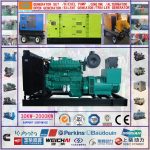Introduction
In remote areas where access to the main power grid is limited or non-existent, diesel generators play a crucial role in providing a reliable source of power for various applications. These generators are especially important in industries, communities, and facilities that operate in off-grid locations, where electricity is essential for operations but not readily available. 75KW Diesel Generator For Sale explores the use of diesel generators for remote power supply, highlighting their benefits, challenges, and sustainable practices.
Overview of Diesel Generators
Diesel generators are a type of backup power system that uses diesel fuel to generate electricity. They consist of an internal combustion engine that runs on diesel fuel and an alternator that converts mechanical energy into electrical energy. Diesel generators are available in various sizes and power capacities to suit different requirements, ranging from small portable units to large industrial-scale generators.
Benefits of Diesel Generators for Remote Power Supply
1. Reliability: Diesel generators are known for their reliability and durability, making them an ideal choice for remote power supply. They can operate continuously for extended periods without interruption, providing a stable source of power even in challenging conditions.
2. Fuel Availability: Diesel fuel is widely available and can be stored for long periods without deterioration. This makes diesel generators a practical choice for remote areas where other fuel sources may be scarce or unreliable.
3. Power Output: Diesel generators are capable of producing high power outputs, making them suitable for running heavy machinery, equipment, and appliances in off-grid locations.
4. Easy Maintenance: Diesel generators are relatively simple to maintain and repair, requiring regular servicing to ensure optimal performance. This ease of maintenance is advantageous in remote areas where access to specialized technicians may be limited.
5. Cost-Effective: While the initial investment in a diesel generator may be higher than other power sources, the overall operating costs are often lower due to the efficiency and reliability of diesel generators.
Challenges of Using Diesel Generators for Remote Power Supply
1. Environmental Impact: Diesel generators emit pollutants such as carbon dioxide, nitrogen oxides, and particulate matter, contributing to air pollution and climate change. In remote areas with pristine environments, the use of diesel generators can have a negative impact on air quality and biodiversity.

2. Noise Pollution: Diesel generators are known for their noise emissions, which can be disruptive to wildlife and nearby communities in remote areas. Noise pollution from generator operations can also affect the well-being of individuals working or living in the vicinity.
3. Fuel Storage and Transport: Storing and transporting diesel fuel to remote locations can pose logistical challenges and safety risks. Spills and leaks during fuel handling can contaminate soil and water sources, leading to environmental damage.
4. Dependence on Fossil Fuels: Diesel generators rely on fossil fuels for operation, making them a contributor to greenhouse gas emissions and climate change. In the long term, the dependence on diesel fuel may not be sustainable as the world transitions towards renewable energy sources.
Sustainable Practices for Using Diesel Generators in Remote Areas
1. Energy Efficiency: Improving the energy efficiency of diesel generators can help reduce fuel consumption and minimize emissions. Regular maintenance, tuning, and load optimization are essential practices to enhance the efficiency of generator operations.
2. Hybrid Systems: Integrating diesel generators with renewable energy sources such as solar, wind, or hydro power can reduce the reliance on fossil fuels and lower the environmental impact of remote power supply systems. Hybrid systems offer a more sustainable and cost-effective solution for off-grid locations.
3. Fuel Management: Implementing proper fuel management practices, such as efficient storage, monitoring, and handling of diesel fuel, can help prevent spills and leaks that can harm the environment. Using high-quality fuel and additives can also improve the performance and longevity of diesel generators.
4. Emission Control: Installing emission control devices such as exhaust gas scrubbers and catalytic converters can reduce the emissions of harmful pollutants from diesel generators. Regular emissions testing and compliance with environmental regulations are essential to minimize the environmental impact of generator operations.
5. Community Engagement: Involving local communities in the planning and implementation of diesel generator projects can help address concerns related to noise pollution, air quality, and environmental sustainability. Promoting awareness and education about the benefits and challenges of diesel generators can foster a sense of ownership and responsibility among stakeholders.
Conclusion
Diesel generators play a vital role in providing reliable power supply in remote areas where access to the main grid is limited. While diesel generators offer numerous benefits in terms of reliability, power output, and availability, they also present challenges related to environmental impact, noise pollution, and fuel management. By adopting sustainable practices such as energy efficiency, hybrid systems, fuel management, emission control, and community engagement, the use of diesel generators for remote power supply can be made more environmentally friendly and socially responsible. As we strive to meet the energy needs of remote areas while minimizing our impact on the environment, the integration of diesel generators with sustainable practices is essential for ensuring a reliable and sustainable power supply in off-grid locations.
